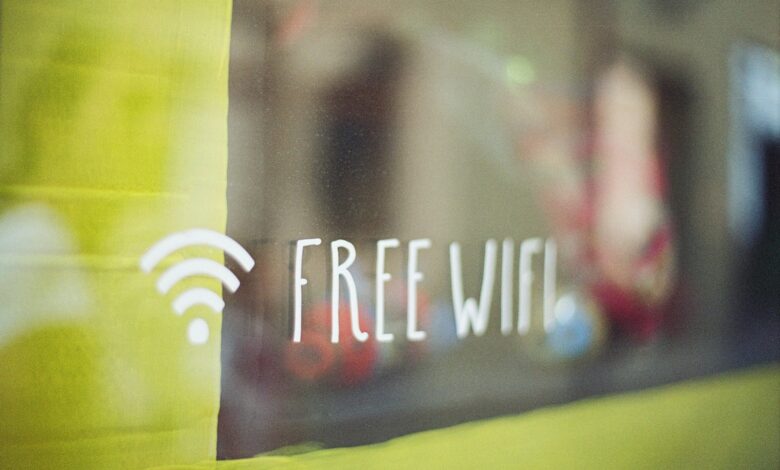
[ad_1]
Why Public WiFi Is a Serious Threat to Your Travel PlansYou’ve meticulously planned your dream vacation, a getaway filled with new experiences and much-needed relaxation.
You arrive at your destination, ready to unwind and create lasting memories with friends and family. You connect to the public WiFi at the hotel to post some pictures and videos on Instagram and check your banking app. But you were unaware of the dangers of public WiFi. It’s likely that your sensitive information is vulnerable to hackers.
Public Wi-Fi may be convenient, but it has hidden dangers that can turn your dream vacation into a security nightmare. This article will inform you about the potential threats lurking on public Wi-Fi networks and will equip you with essential tips to safeguard your data while traveling.
How Public Wi-Fi Can Disrupt Your Dream Vacation
Public Wi-Fi is a seemingly convenient and harmless amenity offered at airports, hotels, cafes, and even tourist attractions. However, it can cause your dream holiday to unravel in a matter of seconds.
Public Wi-Fi networks are often unsecured, meaning your online activity is visible to anyone lurking on the network. This includes the websites you visit, login credentials you enter, and even sensitive data like credit card numbers or banking information. Hackers can easily intercept this data, leading to identity theft and financial losses.
It’s also a breeding ground for malware. Clicking on malicious links or downloading infected files can compromise your device, exposing your personal information and disrupting your travel plans. Imagine losing access to your travel documents or essential booking confirmations due to malware infection!
Cybercriminals have become more cunning as the years have gone by. The latest threat? Spoofed networks. Beware of fake Wi-Fi hotspots! Cybercriminals often set up networks with names that mimic legitimate ones, tricking you into connecting and inadvertently exposing your data. This can be particularly dangerous at tourist destinations where travelers are more likely to seek internet access.
The Hidden Dangers Lurking on Public Networks
There are several dangers that you could face when using a public WiFi network. Here are just a few of the most common ones you might encounter.
Man-in-the-Middle attacks (MiTM)
Digital eavesdroppers. That’s right, a Man-in-the-Middle attack is where hackers position themselves between your device and the Wi-Fi network. They can then intercept your data traffic, including login credentials, emails, and even messages. This stolen information can be used for identity theft, financial fraud, or even accessing your online accounts.
Unencrypted networks
Not all Wi-Fi networks are created equal. Many public networks lack encryption, which scrambles data as it travels between your device and the network. Without encryption, your data is transmitted in plain text, making it easily accessible to anyone on the network, including hackers.
Snooping and data theft
Unsecured networks are vulnerable to “snooping.” Hackers can use readily available tools to monitor network traffic and capture sensitive information like passwords, credit card details, and browsing history. This stolen data can be used for various malicious purposes, causing significant financial and personal harm.
Malware downloads
Public Wi-Fi networks can act as gateways for malware distribution. Clicking on malicious links or downloading infected files can unknowingly install malware on your device — this is also known as phishing. This malware can steal your personal information, disrupt your device’s functionality, or even spread to other connected devices.
Essential Tips for Securing Your Data on the Go
While public Wi-Fi can be dangerous for travelers, there’s no need to avoid it entirely. You need an internet connection after all. As long as you use responsible online practices and implement a few key security measures, you can significantly reduce the risks and safeguard your data while you enjoy your holiday.
Firstly, you need to use a VPN at all times. A Virtual Private Network (VPN) encrypts your internet traffic, creating a secure tunnel between your device and the internet. This encryption renders your data unreadable to anyone snooping on the network, protecting your login credentials, financial information, and browsing activity. Consider investing in a reputable VPN service before your travels and familiarize yourself with its features.
Even with a VPN active, you should always think twice before clicking on a link. Exercise caution when using public Wi-Fi. Avoid accessing sensitive websites like online banking or entering login credentials for important accounts. Refrain from clicking on suspicious links or downloading files from unknown sources. Remember, if something seems too good to be true online, it probably is.
Finally, make sure to load up on security software. VPNs are great tools for protecting your device and encrypting networks, but sometimes you need to go the extra mile. Consider investing in premium antivirus software. This software will constantly scan your devices for any viruses or other forms of malware that may have infected your device. If anything malicious is found, you can take action to remove them from your device before they cause you any headaches.
You arrive at your destination, ready to unwind and create lasting memories with friends and family. You connect to the public WiFi at the hotel to post some pictures and videos on Instagram and check your banking app. But you were unaware of the dangers of public WiFi. It’s likely that your sensitive information is vulnerable to hackers.
Public Wi-Fi may be convenient, but it has hidden dangers that can turn your dream vacation into a security nightmare. This article will inform you about the potential threats lurking on public Wi-Fi networks and will equip you with essential tips to safeguard your data while traveling.
How Public Wi-Fi Can Disrupt Your Dream Vacation
Public Wi-Fi is a seemingly convenient and harmless amenity offered at airports, hotels, cafes, and even tourist attractions. However, it can cause your dream holiday to unravel in a matter of seconds.
Public Wi-Fi networks are often unsecured, meaning your online activity is visible to anyone lurking on the network. This includes the websites you visit, login credentials you enter, and even sensitive data like credit card numbers or banking information. Hackers can easily intercept this data, leading to identity theft and financial losses.
It’s also a breeding ground for malware. Clicking on malicious links or downloading infected files can compromise your device, exposing your personal information and disrupting your travel plans. Imagine losing access to your travel documents or essential booking confirmations due to malware infection!
Cybercriminals have become more cunning as the years have gone by. The latest threat? Spoofed networks. Beware of fake Wi-Fi hotspots! Cybercriminals often set up networks with names that mimic legitimate ones, tricking you into connecting and inadvertently exposing your data. This can be particularly dangerous at tourist destinations where travelers are more likely to seek internet access.
The Hidden Dangers Lurking on Public Networks
There are several dangers that you could face when using a public WiFi network. Here are just a few of the most common ones you might encounter.
Man-in-the-Middle attacks (MiTM)
Digital eavesdroppers. That’s right, a Man-in-the-Middle attack is where hackers position themselves between your device and the Wi-Fi network. They can then intercept your data traffic, including login credentials, emails, and even messages. This stolen information can be used for identity theft, financial fraud, or even accessing your online accounts.
Unencrypted networks
Not all Wi-Fi networks are created equal. Many public networks lack encryption, which scrambles data as it travels between your device and the network. Without encryption, your data is transmitted in plain text, making it easily accessible to anyone on the network, including hackers.
Snooping and data theft
Unsecured networks are vulnerable to “snooping.” Hackers can use readily available tools to monitor network traffic and capture sensitive information like passwords, credit card details, and browsing history. This stolen data can be used for various malicious purposes, causing significant financial and personal harm.
Malware downloads
Public Wi-Fi networks can act as gateways for malware distribution. Clicking on malicious links or downloading infected files can unknowingly install malware on your device — this is also known as phishing. This malware can steal your personal information, disrupt your device’s functionality, or even spread to other connected devices.
Essential Tips for Securing Your Data on the Go
While public Wi-Fi can be dangerous for travelers, there’s no need to avoid it entirely. You need an internet connection after all. As long as you use responsible online practices and implement a few key security measures, you can significantly reduce the risks and safeguard your data while you enjoy your holiday.
Firstly, you need to use a VPN at all times. A Virtual Private Network (VPN) encrypts your internet traffic, creating a secure tunnel between your device and the internet. This encryption renders your data unreadable to anyone snooping on the network, protecting your login credentials, financial information, and browsing activity. Consider investing in a reputable VPN service before your travels and familiarize yourself with its features.
Even with a VPN active, you should always think twice before clicking on a link. Exercise caution when using public Wi-Fi. Avoid accessing sensitive websites like online banking or entering login credentials for important accounts. Refrain from clicking on suspicious links or downloading files from unknown sources. Remember, if something seems too good to be true online, it probably is.
Finally, make sure to load up on security software. VPNs are great tools for protecting your device and encrypting networks, but sometimes you need to go the extra mile. Consider investing in premium antivirus software. This software will constantly scan your devices for any viruses or other forms of malware that may have infected your device. If anything malicious is found, you can take action to remove them from your device before they cause you any headaches.
Why Public WiFi Is a Serious Threat to Your Travel PlansYou’ve meticulously planned your dream vacation, a getaway filled with new experiences and much-needed relaxation.
You arrive at your destination, ready to unwind and create lasting memories with friends and family. You connect to the public WiFi at the hotel to post some pictures and videos on Instagram and check your banking app. But you were unaware of the dangers of public WiFi. It’s likely that your sensitive information is vulnerable to hackers.
Public Wi-Fi may be convenient, but it has hidden dangers that can turn your dream vacation into a security nightmare. This article will inform you about the potential threats lurking on public Wi-Fi networks and will equip you with essential tips to safeguard your data while traveling.
How Public Wi-Fi Can Disrupt Your Dream Vacation
Public Wi-Fi is a seemingly convenient and harmless amenity offered at airports, hotels, cafes, and even tourist attractions. However, it can cause your dream holiday to unravel in a matter of seconds.
Public Wi-Fi networks are often unsecured, meaning your online activity is visible to anyone lurking on the network. This includes the websites you visit, login credentials you enter, and even sensitive data like credit card numbers or banking information. Hackers can easily intercept this data, leading to identity theft and financial losses.
It’s also a breeding ground for malware. Clicking on malicious links or downloading infected files can compromise your device, exposing your personal information and disrupting your travel plans. Imagine losing access to your travel documents or essential booking confirmations due to malware infection!
Cybercriminals have become more cunning as the years have gone by. The latest threat? Spoofed networks. Beware of fake Wi-Fi hotspots! Cybercriminals often set up networks with names that mimic legitimate ones, tricking you into connecting and inadvertently exposing your data. This can be particularly dangerous at tourist destinations where travelers are more likely to seek internet access.
The Hidden Dangers Lurking on Public Networks
There are several dangers that you could face when using a public WiFi network. Here are just a few of the most common ones you might encounter.
Man-in-the-Middle attacks (MiTM)
Digital eavesdroppers. That’s right, a Man-in-the-Middle attack is where hackers position themselves between your device and the Wi-Fi network. They can then intercept your data traffic, including login credentials, emails, and even messages. This stolen information can be used for identity theft, financial fraud, or even accessing your online accounts.
Unencrypted networks
Not all Wi-Fi networks are created equal. Many public networks lack encryption, which scrambles data as it travels between your device and the network. Without encryption, your data is transmitted in plain text, making it easily accessible to anyone on the network, including hackers.
Snooping and data theft
Unsecured networks are vulnerable to “snooping.” Hackers can use readily available tools to monitor network traffic and capture sensitive information like passwords, credit card details, and browsing history. This stolen data can be used for various malicious purposes, causing significant financial and personal harm.
Malware downloads
Public Wi-Fi networks can act as gateways for malware distribution. Clicking on malicious links or downloading infected files can unknowingly install malware on your device — this is also known as phishing. This malware can steal your personal information, disrupt your device’s functionality, or even spread to other connected devices.
Essential Tips for Securing Your Data on the Go
While public Wi-Fi can be dangerous for travelers, there’s no need to avoid it entirely. You need an internet connection after all. As long as you use responsible online practices and implement a few key security measures, you can significantly reduce the risks and safeguard your data while you enjoy your holiday.
Firstly, you need to use a VPN at all times. A Virtual Private Network (VPN) encrypts your internet traffic, creating a secure tunnel between your device and the internet. This encryption renders your data unreadable to anyone snooping on the network, protecting your login credentials, financial information, and browsing activity. Consider investing in a reputable VPN service before your travels and familiarize yourself with its features.
Even with a VPN active, you should always think twice before clicking on a link. Exercise caution when using public Wi-Fi. Avoid accessing sensitive websites like online banking or entering login credentials for important accounts. Refrain from clicking on suspicious links or downloading files from unknown sources. Remember, if something seems too good to be true online, it probably is.
Finally, make sure to load up on security software. VPNs are great tools for protecting your device and encrypting networks, but sometimes you need to go the extra mile. Consider investing in premium antivirus software. This software will constantly scan your devices for any viruses or other forms of malware that may have infected your device. If anything malicious is found, you can take action to remove them from your device before they cause you any headaches.
[ad_2]
Source link






